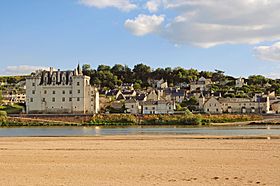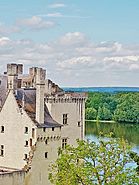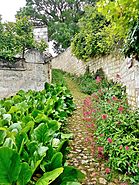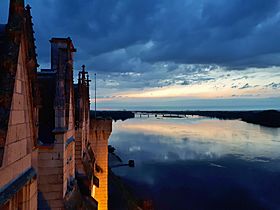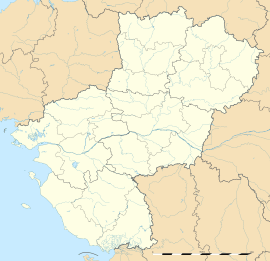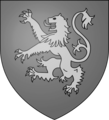Montsoreau facts for kids
Quick facts for kids
Montsoreau
|
||
|---|---|---|
|
Top to bottom, left to right: Panoramic view of the village from the Loire; Château de Montsoreau-Museum of Contemporary Art; Typical street of Monstoreau listed among the most beautiful villages of France; Sunset in Montsoreau from the Château de Montsoreau-Museum of Contemporary Art
|
||
|
||
| Country | France | |
| Region | Pays de la Loire | |
| Department | Maine-et-Loire | |
| Subdivisions | Arrondissement of Saumur | |
| Area
1
|
||
| • Municipality | 5.19 km2 (2.00 sq mi) | |
| • Urban | 5.19 km2 (2.00 sq mi) | |
| • Metro | 1,234 km2 (476 sq mi) | |
| Population
(2009)
|
||
| • Municipality | 544 | |
| • Density | 104.82/km2 (271.5/sq mi) | |
| • Urban | 100,263 | |
| • Urban density | 19,318/km2 (50,030/sq mi) | |
| • Metro | 100,263 | |
| • Metro density | 81.25/km2 (210.44/sq mi) | |
| Demonym(s) | Montsorellien(ne) Montsorellien(ne) (fr) |
|
| Time zone | UTC+01:00 (CET) | |
| • Summer (DST) | UTC+02:00 (CEST) | |
| INSEE/Postal code |
49219 /49730
|
|
| Website | www.ville-montsoreau.fr | |
| 1 French Land Register data, which excludes lakes, ponds, glaciers > 1 km2 (0.386 sq mi or 247 acres) and river estuaries. | ||
Montsoreau is a small, historic town in France, located in Europe. About 500 people live there, but it's close to the larger Saumur, which has over 100,000 residents. Montsoreau is in the western part of France, within the Pays de la Loire region.
This charming town is famous for the Château de Montsoreau-Museum of Contemporary Art. This castle was recently opened by French art collector Philippe Méaille. Montsoreau is also part of the beautiful Loire Valley, which is a UNESCO World Heritage site. It's even listed as one of the most beautiful villages in France!
Contents
Discovering Montsoreau's Past
Montsoreau has a long and interesting history. The oldest sign of people living here is the dolmen of the Pierrelée. This ancient stone structure was likely built around 3000 BC. The town is located where three ancient Gallic tribes once lived: the Pictones, Turones, and Andecavi.
Early Settlements and Names
People have found old coins and pottery pieces from the Gallo-Roman period in Montsoreau. This shows that Romans also lived here a very long time ago.
At the end of ancient times, Montsoreau was known as Restis. This name meant "rope" or "fish net." It was an important port on the Loire River, right where it meets the Vienne River. The town kept this name until the late 1000s.
The name Montsoreau means "Mount Soreau." It comes from a rocky hill in the middle of the Loire River, surrounded by water. Three main buildings have stood on this special spot over time:
- An ancient Gallo-Roman temple or administrative building.
- A strong fortified castle.
- A beautiful Renaissance palace.
Medieval Castles and Battles
The first fortified castle was built by the Count of Blois around the late 900s. But the Count of Anjou, Fulk Nerra, quickly took it over in 1001. He added it to his lands, Anjou. Fulk was one of the first to build many medieval castles. He made the Montsoreau fortress even stronger. It stayed under Anjou's control for over 150 years and was never captured during that time.
In 1152, a local lord named Guillaume IV de Montsoreau supported Geoffroy Plantagenet. Geoffroy was fighting his brother, Henry II Plantagenet, who would later become king of England. Henry II attacked the castle and took it in August 1152. This was the only time the medieval fortress of Montsoreau was captured between Fulk III's time and 1450.
The Renaissance Palace
After the Hundred Years' War, French kings like Charles VII and Louis XI wanted to build new, grand buildings. This led to the start of Renaissance architecture in France. Many famous "Châteaux of the Loire Valley" were built during this time.
In 1450, Jean II de Chambes, an important advisor to King Charles VII, bought the old fortress. He tore it down to build a new, grand home on the Montsoreau rock. This new building, the Château de Montsoreau, was designed in the Italian Renaissance style. It was the very first Renaissance building in France! It was built right on the riverbank and is still the only Loire Valley castle built directly in the riverbed.
Later History
In 1572, after a terrible event in Paris called the St. Bartholomew's Day massacre, Jean de Chambes started similar attacks in the Montsoreau area. He almost completely removed the Protestant Church from Saumur and Angers.
After the French Revolution, more people moved to Montsoreau. This was because a special building stone called Tuffeau stone was being mined there. The town's population grew from 600 to over 1000 people in the early 1800s.
The Battle of Saumur in June 1940 is seen as the first act of resistance in France during World War II.
In Montsoreau, Saumur and Gennes, in June 1940, teenage students of the school of cavalry, still under training and with derisory weapons (including an artillery gun from the school museum), heroically engaged an entire German panzer division for nearly three days. And in doing so became a legend in France. – For Honour Alone, Roy Macnab, January 1989.
Exploring Montsoreau's Location
Montsoreau is located in the middle of the beautiful Loire Valley in northwestern France. It's about 160 km (99 mi) from the Atlantic Ocean. It's also close to other towns like Saumur, Chinon, and Bourgueil, all about 12 km (7.5 mi) away. The town is in the southeastern part of the Maine-et-Loire department. It's roughly halfway between Paris and Bordeaux.
Montsoreau is special because it sits at the meeting point of three main regions: Pays de la Loire, Centre-Val de Loire, and Nouvelle Aquitaine. It also borders three different departments: Maine-et-Loire, Indre-et-Loire, and Vienne.
Montsoreau is part of the larger Saumur Val de Loire area. It shares borders with several nearby towns. These include Candes-Saint-Martin, Chouzé-sur-Loire, Fontevraud-l'Abbaye, and Turquant.
Montsoreau's Climate
Montsoreau has a mild climate. Here's a quick look at the weather:
| Climate data for Montsoreau | |||||||||||||
|---|---|---|---|---|---|---|---|---|---|---|---|---|---|
| Month | Jan | Feb | Mar | Apr | May | Jun | Jul | Aug | Sep | Oct | Nov | Dec | Year |
| Record high °C (°F) | 16.9 (62.4) |
20.8 (69.4) |
23.7 (74.7) |
29.2 (84.6) |
31.8 (89.2) |
36.7 (98.1) |
37.5 (99.5) |
39.8 (103.6) |
34.5 (94.1) |
29.0 (84.2) |
22.3 (72.1) |
18.5 (65.3) |
39.8 (103.6) |
| Mean daily maximum °C (°F) | 11.1 (52.0) |
12.1 (53.8) |
15.1 (59.2) |
17.4 (63.3) |
22.5 (72.5) |
27 (81) |
26.4 (79.5) |
27.2 (81.0) |
21.6 (70.9) |
19.9 (67.8) |
12.7 (54.9) |
9.2 (48.6) |
19.2 (66.6) |
| Daily mean °C (°F) | 6.2 (43.2) |
8.2 (46.8) |
10.8 (51.4) |
10.9 (51.6) |
16.5 (61.7) |
20.6 (69.1) |
20.8 (69.4) |
21.4 (70.5) |
16.5 (61.7) |
15 (59) |
8.5 (47.3) |
5.9 (42.6) |
14.1 (57.4) |
| Mean daily minimum °C (°F) | 8.8 (47.8) |
4 (39) |
6.5 (43.7) |
4.5 (40.1) |
10.6 (51.1) |
14.2 (57.6) |
15.3 (59.5) |
15.3 (59.5) |
11.2 (52.2) |
10.2 (50.4) |
4.4 (39.9) |
2.6 (36.7) |
9.0 (48.2) |
| Average precipitation mm (inches) | 66 (2.6) |
35 (1.4) |
50 (2.0) |
3.5 (0.14) |
45 (1.8) |
51 (2.0) |
27 (1.1) |
15.5 (0.61) |
34 (1.3) |
11.5 (0.45) |
29 (1.1) |
40 (1.6) |
411 (16.2) |
| Average snowy days | 1.7 | 1.9 | 1.4 | 0.2 | 0.1 | 0.0 | 0.0 | 0.0 | 0.0 | 0.0 | 0.4 | 1.3 | 7.0 |
| Average relative humidity (%) | 88 | 84 | 80 | 77 | 77 | 75 | 74 | 76 | 80 | 86 | 89 | 89 | 81.3 |
| Mean monthly sunshine hours | 69.9 | 90.3 | 144.2 | 178.5 | 205.6 | 228 | 239.4 | 236.4 | 184.7 | 120.6 | 67.7 | 59.2 | 1,824.5 |
| Source 1: Climatologie mensuelle à la station de Montreuil-Bellay. | |||||||||||||
| Source 2: Infoclimat.fr (humidity, snowy days 1961–1990) | |||||||||||||
Images for kids
-
Henry II of England attacked and took Montsoreau in 1152.
-
The first act of resistance in France during World War II. On the night of June 18, 1940, the Cadets de Saumur blew up bridges at Montsoreau, Saumur, and Gennes.
-
The courtyard of the Château de Montsoreau-Museum of Contemporary Art during the Anjou Vélo Vintage festival.
-
A painting by J. M. W. Turner, from 1826, showing a sunset on the Loire river with the Vieux-port of Montsoreau and the château.
-
The logo for the movie Close Encounters of the Third Kind.
-
A piece by Art & Language, from 1974, part of the Philippe Méaille collection at the Château de Montsoreau-Museum of Contemporary Art.
-
The visual identity logo for the Château de Montsoreau-Museum of Contemporary Art.
See also
 In Spanish: Montsoreau para niños
In Spanish: Montsoreau para niños
 | Calvin Brent |
 | Walter T. Bailey |
 | Martha Cassell Thompson |
 | Alberta Jeannette Cassell |


